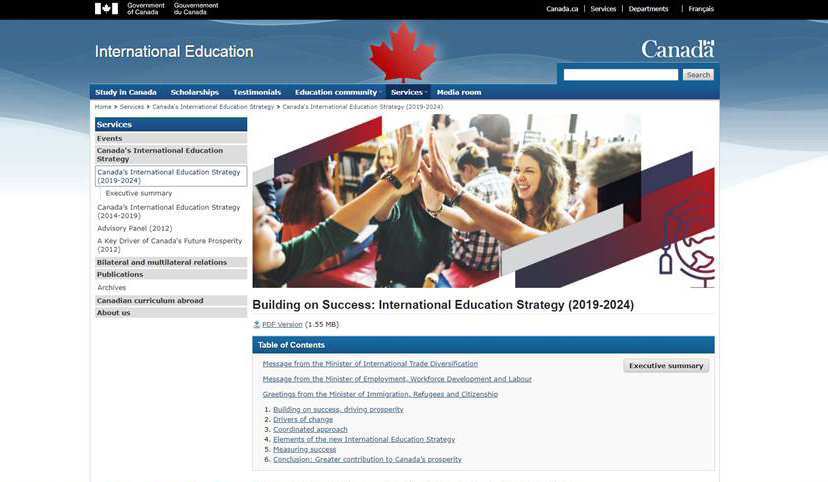 Canada’s International Education Strategy is one of several programmes aimed at global engagement. [photo: Canadian government International Education website]
Canada’s International Education Strategy is one of several programmes aimed at global engagement. [photo: Canadian government International Education website]
[This is an excerpt from an article in The Round Table: The International Journal of Commonwealth Affairs.]
As colleagues have noted in The Round Table in recent months, the Covid-19 pandemic is forcing a rethinking of international education within the Commonwealth. Several commentators have suggested that the Commonwealth, La Francophonie and national associations of universities and colleges are well placed to coordinate efforts for global education, distance learning and shared research.
We suggest more directly that international education will be central to an enhanced multilateralism which may follow the pandemic and will be an imperative if we are to serve the discovery, innovation and learning foundations of our post-secondary institutions. The perspective from Canada and the UK is encouraging – and especially if more globalist perspectives prevail under the Biden administration in the US.
The pandemic has devastated national and international business, decimated the global airline industry, and pushed healthcare capacities beyond the point of sustainability even in robust national systems. Yet one sector has transitioned relatively effectively: education – in particular international education. There is no doubt that our universities, colleges and high schools continue to wrestle with restricted international borders, ever-changing public health and quarantine requirements and temporarily diminished student experience. Despite vaccination programmes in the coming months, effective immunity will be several seasons in the making.
Whether international students will return to former patterns of international mobility is a key question. As 2021 unfolds, the continued difficulties in managing the public health situation in most of the G7 nations remain a serious impediment to the mobility of students and researchers. This may create new geographies of international education, including reducing flows of students to traditional markets such as the United States, the UK, Canada, France, Germany, Australia and New Zealand.
For universities and colleges in Canada and the UK, new global learning initiatives are already underway, bolstered by the successes of past months. With high proportions of courses being delivered online, many students registered in Canada and the UK are currently studying from their home countries, taking advantage of significant investments in information technologies, learning management systems, online educational resources including enhanced opportunities to connect with speakers from around the world. Many universities and colleges have invested significant new resources in high-quality pedagogy, including in programmes to ensure that students are more effective learners in virtual environments and have accompanying wellbeing support.
While we acknowledge that there remain significant issues for globalising higher education (including bandwidth issues, firewalls, copyright issues, the relationship between virtual learning and the in-person collegiate experience), many educators in Canada and the UK agree that it is imperative that we continue our quick adaptation and build responsive new structures and collaborations.
For example, Canada’s International Education Strategy launched in 2019 committed $147 million over five years to strengthen connections into emerging markets such as Vietnam, the Philippines and Colombia. While the pandemic delayed the complete roll-out of this programme in 2020, 2021 will see further components launched. The Province of Nova Scotia has expanded its successful ‘Study and Stay’ programme for international students, extending the programme to all provinces in Atlantic Canada in partnership with the federal government’s Atlantic Growth Strategy. At the federal level, the Queen Elizabeth Scholars Programme, administered by Universities Canada and the Rideau Hall Foundation, is expanding into west Africa, complementing existing programming in east Africa and the Caribbean. And as a result of recent lobbying from post-secondary institutions, the Canadian government has improved access to the post-graduate work permit for international students, better aligning Canada’s well-intentioned but bureaucratic immigration processes with the goals of higher education and labour force development.
Amelia Hadfield is the Head of the Department of Politics, University of Surrey, UK and Robert Summerby-Murray is the President and Vice-Chancellor of St Mary’s University, Halifax, Canada.



